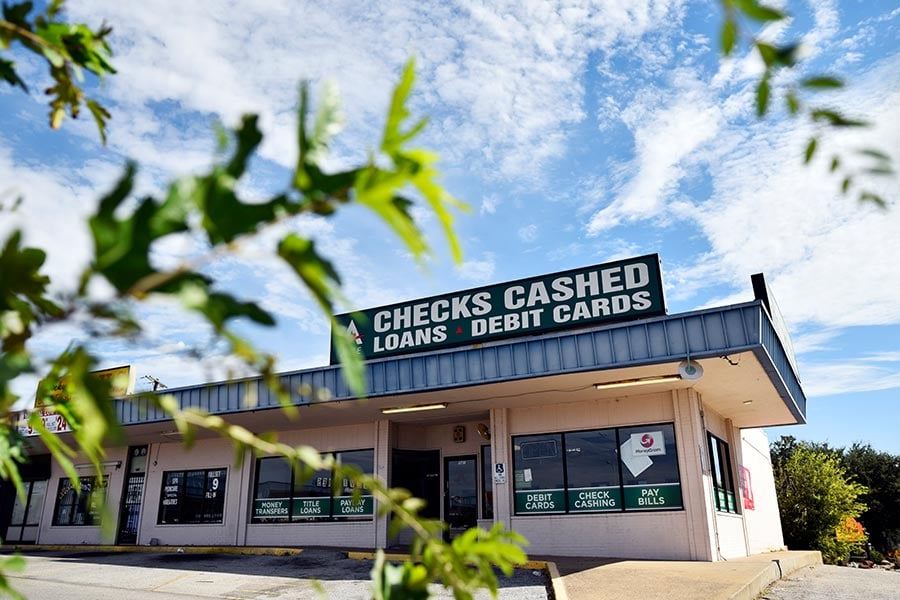Protections against predatory lending practices rescinded, but Vincentians offer alternatives

Fort Worth and Arlington are home to several dozen payday loan stores like this one on East Lancaster Avenue in Fort Worth. (NTC/Ben Torres)
FORT WORTH — “As a teacher I knew better but, at the time, it was all I could do.”
That’s how Debbie O. described the financial crisis that sent her to a well-advertised title loan company for some quick cash.
Forced to retire early so she could care for an elderly relative, Debbie found herself unable to pay a mounting stack of rent and utility bills. Although the interest rate for borrowing the money was 300 to 400 percent, the convenience and temporary reprieve from late notices was enticing.
“It was very easy to get the money,” admitted the Arlington resident who walked away from the storefront with a $1,500 check in her pocket. “They knew I was substitute teaching and owned a car. If I didn’t repay the loan, they would take the car.”
Rather than help her finances, the loan only added to her debt load and stress level. Many times, borrowers pay more in interest and fees than the amount they borrow because the loan isn’t paid in full when it’s due.
It’s a predicament facing thousands of U.S. consumers, especially in Texas, where few protections exist.
And relief from predatory practices isn’t coming soon. The Consumer Financial Protection Bureau (CFPB) issued its final rule on small-dollar lending July 7. The decision, condemned by the Texas Fair Lending Alliance, the Christian Life Commission, and the Texas Catholic Conference of Bishops, rescinds national protections that could help consumers avoid a cycle of debt. Finalized in 2017, “ability-to-pay” safeguards were established after five years of in-depth research by the CFPB. But they were removed in July’s amended ruling “to maintain consumer access to credit and competition in the marketplace,” the federal agency announced in a press release.
According to the TFLA, from 2012 to 2017, Texans paid $9.2 billion in fees alone for high-cost loans. During the same period, 218,347 families lost a car to an auto title loan. Just last year, payday lenders and auto title loan outfits repossessed 42,878 cars from Texans in need. Payday and title lenders tend to attract customers from low-income and other vulnerable populations desperate for credit.
Led by the Texas bishops, Faith Leaders 4 Fair Lending, together with the TFLA, advocate to reform abusive payday and auto title ending practices at the local, state, and federal level.
“Proposed rules would have limited the number of loans borrowers could make in a row and required lenders to verify that customers had the means to pay back the debt,” said Rozanne Veeser, administrator of the Mini-Loan Conversion Program (MLCP) offered locally by the Society of St. Vincent de Paul.
Started in 2016, the parish-based nonprofit helps individuals pay off the current balance of a payday or title loan by qualifying for a very low-interest conversion loan. More than 100 borrowers have participated in the MLCP since its inception, with some receiving bonus money for repaying the loan and completing financial counseling.
“Why did the CFPB gut protections? Because it felt they would impinge on the (high-cost loan) lender’s ability to make money,” Veeser surmised. “It means there won’t be any limit to the money these places can make.”
A cost-benefit analysis cited by the CFPB in its final decision predicts the payday and auto title loan industry could see additional profits between $3.9 billion and $4.1 billion a year.
“This rule will boost the bottom lines of these high-cost lenders at a time of unprecedented economic hardship for Texans and all Americans,” stated a July 8 press release jointly issued by the TFLA and Texas Faith Leaders 4 Fair Lending. “In contrast, consumer protection would be weakened by repealing ability-to-pay underwriting standards.”
Shannon Rosedale, a policy analyst with Catholic Charities Fort Worth, agrees. Calling the CFPB’s decision to rescind payday-lending protections “devastating news,” she said the result will impact vulnerable populations in the community, “including the families we serve.”
“The decision to remove the underwriting mandate will allow predatory lenders to target and trap people in a cycle of harmful debt which is nearly impossible to end,” Rosedale said. “By forgoing any ability-to-pay verification, families in their most desperate time will be exposed to the harsh conditions of payday and auto title lenders further perpetuating their poverty.”
A study by the Pew Charitable Trusts showed 69 percent of those who take out payday loans use the money for recurring debt. The average borrower takes out eight loans a year spending $520 on interest and fees for an average $500 loan. Most borrowers lack a college degree and earn less than $40,000. Many are women between the ages of 25 and 44.
Helped by the St. Vincent de Paul Society, Debbie O. was able to convert her burdensome $1,500 title loan to a monthly $79 installment made to a local credit union. Workers at the title loan company were stunned when she handed over a check for payment in full.
“I probably saved $700 to $800 in interest,” said the grateful MLCP participant. “The St. Vincent de Paul Society trusted me to be faithful with the payment to the credit union and I was. When I paid it off last year, my credit score went up 30 points or more.”
But the greatest benefit was relief.
“Paying off that title loan would have been a real struggle,” she added.
To learn more about SVdP’s Mini-Loan Conversion Program, or to donate, visit svdpfw.org/mlcp
